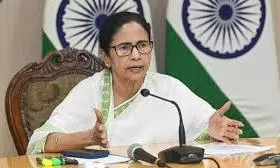AA Edit | WB violence must stop; fight Waqf law in court
Three persons, including a father-son duo, have lost their lives in the Murshidabad district of West Bengal in the last two days in violence following protests against the Waqf (Amendment) Act, which provided for the appointment of non-Muslims in Waqf Boards, which are essentially an arrangement to run properties donated by faithful to causes sanctioned by Islam;

Passage of a law and protests against it are part of the democratic process but vested interests using it as an excuse to incite violence and a local politician declaring a resolution not to implement it are not. What’s worse is a constitutional court stepping in to take over the responsibility of maintaining law and order. West Bengal finds itself in a crisis in the wake of the passage of the Waqf (Amendment) Act, 2025, and its reasons are not far to seek. All those who have a responsibility to run that state as per the mandates of the Constitution and the law must take a step back in order to help bring the affected region of the state back to normalcy and peace.
Three persons, including a father-son duo, have lost their lives in the Murshidabad district of West Bengal in the last two days in violence following protests against the Waqf (Amendment) Act, which provided for the appointment of non-Muslims in Waqf Boards, which are essentially an arrangement to run properties donated by faithful to causes sanctioned by Islam. A large section of the community is offended by certain sections of the law while the secular-minded people have serious issues with it, too, as they feel it violates several articles of the Constitution. While public protests and legal challenges are democratic means of protests, there is hardly a justification for violence or for creating a provocative atmosphere for violence. The protesters must ensure that they do not cross the line, and must keep in mind the fact that the very forces which they think are instrumental to dividing society along communal lines are waiting for a chance ahead of the next year’s Assembly elections.
The declaration of chief minister Mamata Banerjee that the law will not be implemented in the state cannot be dismissed as rhetoric. She may have justifiable objections to the new law but there are ways to express them. The state government can very well meet the demands of the Muslim community against the inclusion of non-Muslims in the Waqf Boards through administrative means and within the boundaries of the law. However, she must remember the Constitution does not permit the chief ministers to make a choice of the Central laws they would implement in their states. Even legitimate protest against an act of the Union government cannot become a reason for public defiance of the Constitution and the rule of law. Ms Banerjee must work with the constitutional framework to politically and legally oppose the law instead of resorting to a grandstanding that does not behove her position.
A special bench of the Calcutta high court ordering deployment of Central paramilitary forces in Murshidabad is nothing but an unconstitutional step indulged by a guardian institution of the Constitution. India is not a banana republic where a high court chief justice, on the petition of an Opposition politician, forms a special bench which says “it cannot be a mute spectator and embroil in technical defences when the safety and security of the people are in danger”. Sorry, ensuring the safety and security of the people is the job of the state government, and not of the high court, and there are mechanisms to address a situation where the state government fails to do its job. The constitutional courts should not give the impression that they are waiting for a chance to become players when their job is to ensure that the players obey the rules. The Constitution-makers had that vision when they talked of division of power. Issues are best addressed by constitutional means; ad hoc and arbitrary actions by responsible institutions and bodies cannot ameliorate an already-bad situation.

